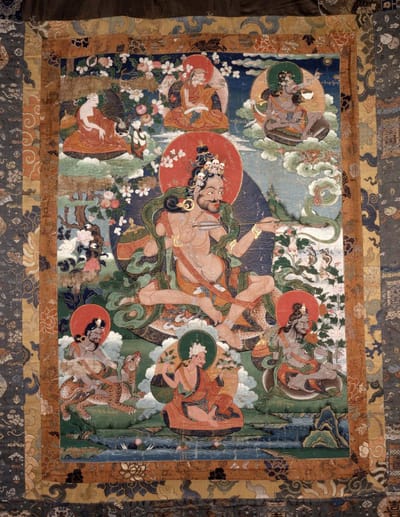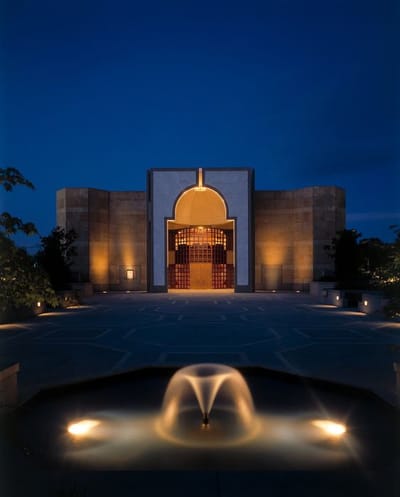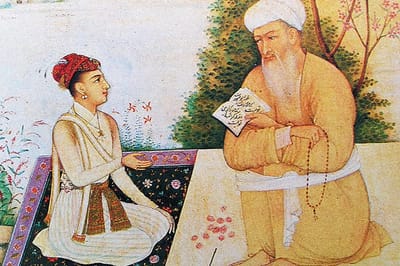A Response to this Journal's Mission Statement
This article originally appeared in Volume 1 of the print edition of Sacred Web in July 1998
At the kind invitation of Mr. Ali Lakhani, the enterprising founder and editor of this new journal, I respond here to the mission statement, under which homiletic sign the journal goes forth. I cannot promise to respond systematically; have always preferred conversation to other forms of exchange, and preferred literature, however formal, that retains some undercurrent of the spoken word. And so, Mr. Lakhani, can we sit together?—for example beneath an open tea tent at a village market not far from Marrakesh.
I remember the scene vividly even now: the worn but welcoming carpets and cushions, the tumblers filled with mint tea and sunlight, the rich sounds, sights, and scents of traditional peasant Muslim society all around—small vendors of handcrafted household goods, of herbs and remedies, of carpets and buttons, camels and donkeys; these fine weathered faces beneath turbans and shawls, each implying a life that had not been easy, and had been worthwhile. Perhaps in the evening and through the night we can attend a village ceremony, half religious, half convivial. I remember a dance with magical drumming: the villagers gathered into a line, linked arms and hands, and somehow lifted and folded rhythmically. It was of that very time and place, yet raised us. I was so happy; you will be, too. All of this was and is the common face of Tradition, which supports and warms even the most refined things of the spirit. Let us sit in such a place.
They can be found even today in nearly all parts of the world. And I think one can affirm, without being sentimental or “Orientalist” in the invidious sense, that as an urban person of East or West one experiences in such settings both a deep sense of well being and a stabbing sense of loss, for this is not how one lives, nor is the thrust of the modern world leading toward preservation of such things. On the contrary, such timeless environments are burning away, like the vast acreages recently reduced to ash in Indonesia, Borneo, Mexico. You have taken note of this tendency to loss in your mission statement.
If that is the common face of Tradition, shouldn’t we also remember the uncommon face of it, the schools and teaching/learning circles in which doctrine and practice are passed “from mouth to ear,” by sages who in their turn studied with sages… and so on, through the corridors of time? Some at least of these lineages lead back to eras of Revelation or to great renovators by whom whole traditions were restored to their original freshness and sharp cut. This is also the realm of texts—I would willingly capitalize to Texts, for the scripture, commentary, practice guides, recorded myths, histories and tales, the seekers’ journals and saints’ biographies that make up the library of Tradition are sacred to anyone who experiences the ache to be and to know, to uncover the Imperishable in the obvious fragility of our lives.
As you surely see, I share the regard for Tradition to which you bear witness. And yet… I have never quite understood why the voice of Tradition in our time—I suppose I mean the voices of Traditionalists—is so often, at times so luxuriantly, that of prophetic wrath. The Traditionalist jeremiad recalls its grand original in scripture associated with the prophet Jeremiah, whom the Lord shaped into a fierce, ever-renewed reminder to the people:
For, behold, I have made thee this day a defenced city, and an iron pillar, and brasen walls against the whole land, against the kings of Judah, against the princes thereof, against the priests thereof, and against the people of the land. (Jeremiah 1.18)
Blended with the Biblical voice of wrath against the wayward people, does one not also hear in our contemporary lamentation the Quranic voice:
How many generations have We destroyed since Noah’s time! Your Lord is well aware of His servants’ sins; He observes them all. (Quran XVII.17)
How best to understand the “defenced city,” the “iron pillar” of 20th-century Traditionalism? It is fully voiced in the third paragraph of the mission statement: “…a world of increasing fragmentation and spiritual poverty; a world accultured by the hubris of science and the materialistic creed of economic exploitation,…a world of promiscuity, consumerism, crime, corruption, bigotry, exploitation, disease,” and so on. One can say of this passage, I think justly, that it is to be understood as a summary of observations made in extenso in the writings of René Guénon, Ananda K. Coomaraswamy, Frithjof Schuon, Seyyed Hossein Nasr, and other primary exponents of the Traditional perspective. For many readers of this journal, their writings are magisterial illuminations, the greatest of which one will never forget; their thought and pulse enter one.
But is there no danger here—danger perhaps of a certain self-satisfaction, of pride in knowing the names of the devil? Is there no momentum here, by which one adds insult to injury with a certain relish—as if each term further distanced one from the dreadful reality to which it refers?
Practical redemptive work is relentlessly day-to-day, whether one seeks at least a little to redeem and dignify one’s poor self, or to contribute to the lives of others, or to confront resourcefully some challenge on the larger scales of society and planet. We live under what one wise teacher called “the law of small increments,” by which we gain or lose a little each day. I am saying, then, that to inventory the fearful sins and stupidities of modernity must never give pleasure, and that the Great Work is the small work, the day-to-day work. This need not—although it can—force a narrow perspective. One need not—although one does—lose one’s awareness of the unutterable grandeur of Creation and of its Divine Author as one attends to the innumerable details of any small redemptive work. On the contrary, every reading from a sacred book, every meditation, every communal effort can be a step toward Reality in the sense conveyed as a prayer in Brihadaranyaka Upanishad 1.3.28:
From the unreal lead me to the real!
From darkness lead me to light!
From death lead me to immortality!
I wonder whether modern history is merely, and abjectly, a diversion from whatever course events might have taken, had we been wiser. I wonder whether science and technology are essentially sinful, in that they cannot but divert us from what the mission statement properly calls a sense of the sacred. In its second paragraph, the statement seeks to deal fairly with the contemporary world by remembering some of our achievements—medical science, for example, and space travel which has given us our first good look at our planetary home. But those acknowledgments are drained by a short and telling phrase to the effect that these things provoke an evil: they “almost make us believe that we are gods capable of anything.” Is this really so? Admittedly, the phrase “masters of the universe” has been coined, by wits in our own culture, to describe young financial wizards who have made quick fortunes and feel on top of the world. But about that very community, a witty novel was written and widely read, Tom Wolfe’s Bonfire of the Vanities, which rather puts them in their place. I do not think that many of us construe this dangerous world as good proof that “ye shall be as gods” (Genesis 3.5) or that we are anything like gods. Too much AIDS, too much cancer, too much war, too much poverty, too many frightening ecological portents, too much social dislocation, too much violence and noise in the popular arts, too many self-serving political leaders. This is my own list.
…how can love and knowledge of Tradition contribute to human welfare?
But there are more serious questions to ask of modern history and of our current culture: if they are not a diversion into utter darkness—if they are, as almost always in human affairs, a chiaroscuro through which we must of necessity find our way—then what general perspective might make sense? And how can love and knowledge of Tradition contribute to human welfare?
I cannot altogether abandon the Judaeo-Christian conviction of an unfolding narrative, suffused with Divine love and intent but offered entirely into our hands by the Good Lord, and by His will subject to our individual and collective choices. In this light, I do not perceive science and technology as monstrous—how could I do so as I write on a first-rate computer, communicate by e-mail with the editor of this journal, answer the telephone from time to time, and expect easily to join friends this evening who live at 15 miles’ distance across the river? If we choose poorly, science and technology will indeed prove to have been monstrous—not intrinsically so, but in our hands. This is, of course, a cliché; that does not mean it is untrue.
We have reached a stage of culture in which quantitative scientific observation has at last caught up with Pascal’s premonitory vertigo as he contemplated the “two infinitudes,” the infinitely small and the infinitely great. This stage is, like all prior stages of culture, a field of choice in which much if not all depends on the wisdom of our choices. What, then, is the role of Tradition? Each of us who cares will perhaps answer this question a little differently. The mission statement of this promising new journal speaks of the need “to identify Traditional ‘first principles’ and their application to the contingent circumstances of modernity, and to expose the false premises of modernity….” This is surely sensible. But do it with love, by which I mean do it patiently, with an eye not only to the Truth but to people here and now, and not only to “people here and now” but to this very person whom you address and whom you might also feel and know. Do not permit the awesome beauty of scripture, and even of religious practice, to lure you away from contact with this thinking, feeling flesh that we are.
Somewhere in his writings, Coomaraswamy recalled the title of Oliver Goldsmith’s late 18th-century play, She Stoops To Conquer. He cited it, as you can imagine, not as a matter of theater history but to make a larger point. The stoop into the real texture of life that he advised remains binding on all who have been touched and changed by our encounters with Tradition. That “descent,” as you well know, ushers us into a realm of sacred paradox where the way up is the way down (Heracleitus), where the fulfillment of the highest is consummated through its contact and possible union with ordinary things.
Well, Mr. Lakhani, we have occupied this breezy tent through much of the day and consumed our fair share of mint tea. It is surely time to take leave. I value our fraternal contact and trust that this will not have been our only opportunity to exchange. We can meet later, as I suggested, in the village—but on second thought, I must return to the city where I hope to find a piano to work further on the four-voice fugue by J.S. Bach that has lately given me no sleep.





